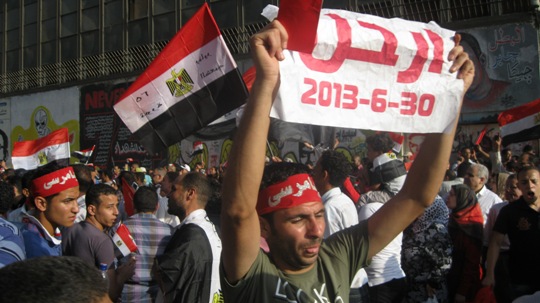Latest NEWS
- Aswat Masriya, the last word
- Roundup of Egypt's press headlines on March 15, 2017
- Roundup of Egypt's press headlines on March 14, 2017
- Former Egyptian President Hosni Mubarak to be released: lawyer
- Roundup of Egypt's press headlines on March 13, 2017
- Egypt's capital set to grow by half a million in 2017
- Egypt's wheat reserves to double with start of harvest -supply min
- Roundup of Egypt's press headlines on March 12, 2017
The state of Egypt's youth, the driver behind Mursi's toppling

Anti-Mursi protests in Tahrir Square on Sunday, June 30, 2013 - Saif Eldin Hamdan/Aswat Masriya
The now-banned Muslim Brotherhood's rise to power began in June 2012, when ousted president Mohamed Mursi climbed to the presidency. His reign lasted one year and he was toppled in July 2013, following mass protests against him.
Tamarud started out in April 2013 as a grassroots campaign calling for early presidential elections. Mainly comprising of young active Egyptians, it is seen as the driving force behind Mursi's military ouster.
Mohamed Heikal, one of the movement's founding members, has now deviated from politics, choosing a social development path instead.
Working with another Tamarud founding member, Hassan Shahin, Heikal has founded a movement titled "Rawabet al-Shabab".
The movement is completely separate from Tamarud, which both Heikal and Shahin have left. It is dedicated to developing municipalities and aims to mobilise youth to participate in the coming local council elections.
Heikal said that youth nowadays are divided between those who "want to build the country" and those who "want to bomb it." He complained of a "political vacuum which state institutions find themselves obliged to fill."
"We have destroyed corrupt regimes," Heikal said. "Building [new regimes] is a hard task … We need to fill in the vacuum and create a body that would build the country."
The youth have been "frustrated" recently, said Heba Yassin, who despite this frustration remains politically active.
Two years ago, Yassin was the spokeswoman of al-Tayar al-Shaaby, a political movement co-founded by former presidential candidate Hamdeen Sabahy in 2011.
She left the movement in late 2014, when it sought to convert to a political party and returned to her original party, al-Karama Nasserist party.
Yassin actively partook in protests against the Muslim Brotherhood, in 2012 and 2013.
Two years onwards, Yassin believes there is a "decline in freedoms".
She added that there are youth who have been arrested only because they went out to express their opinions. "I am not talking about Brotherhood [members] or people who took part in violent acts."
Similar to Yassin, activist Dina Youssef says "anyone could be arrested" for voicing objection to anything.
Youssef is focusing her efforts on aiding people behind bars, to provide them with books, blankets, socks, food and nowadays, warm meals during the Islamic fasting month of Ramadan.
It started with a personal initiative, she said, but later a group of people became involved.
Calls for donations are made on Facebook, where people are asked to donate items that will be handed to detainees, instead of money. The items are given to detainees through family members during visits.
Youssef has marched against Mursi's regime, in the last days of his reign. She believes the worst thing that has happened since is the "suppression, the suppression of the youth's opinion and of their participation in political life."
Despite this, Youssef has taken part in demonstrations to call for the release of detainees. "We do anything," for them to be released, she said.
"Nothing," said Youssef when asked about that best thing that has happened over the past two years.
Ahmed Nassef, spokesman of the Students Against the Coup movement, did not take part in any protests in support of June 30 or against it. He nevertheless became active on the streets since Mursi's military ouster.
Two years on, Nassef is still on the same path, actively protesting Mursi's ouster, which he describes as a "coup".
"Throughout the two years, young friends of ours have died … we cannot not continue," Nassef said. "Youth are the only hope for eradicating injustice and corruption."
The student said the status of the youth currently lacks any form of freedom, both inside universities and outside.
"Oppression has reached all youth," Nassef said. He added that the state lacks a clear vision for the educational process.
Throughout the past two years, Nassef said the worst thing that happened was the death of students on campus.
University campuses have witnessed unprecedented violence throughout the academic year which followed Mursi's ouster. At least 21 students were killed amid on-campus violence during the past two years, according to the Association for Freedom of Thought and Expression.
The Egyptian government denies that it is targeting the youth. On June 30, Egypt's Foreign Ministry said recent claims in a report by Amnesty International that Egypt targets the youth are "false".










